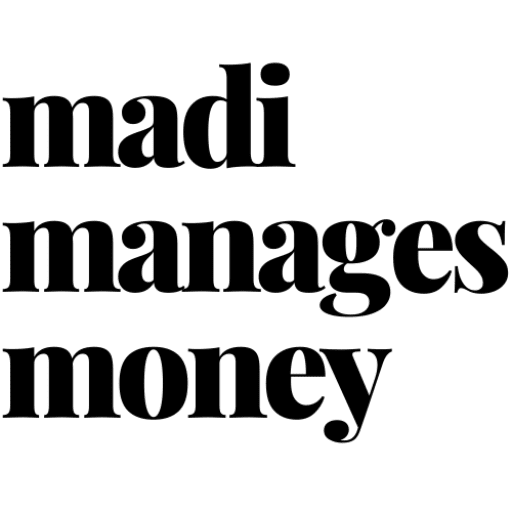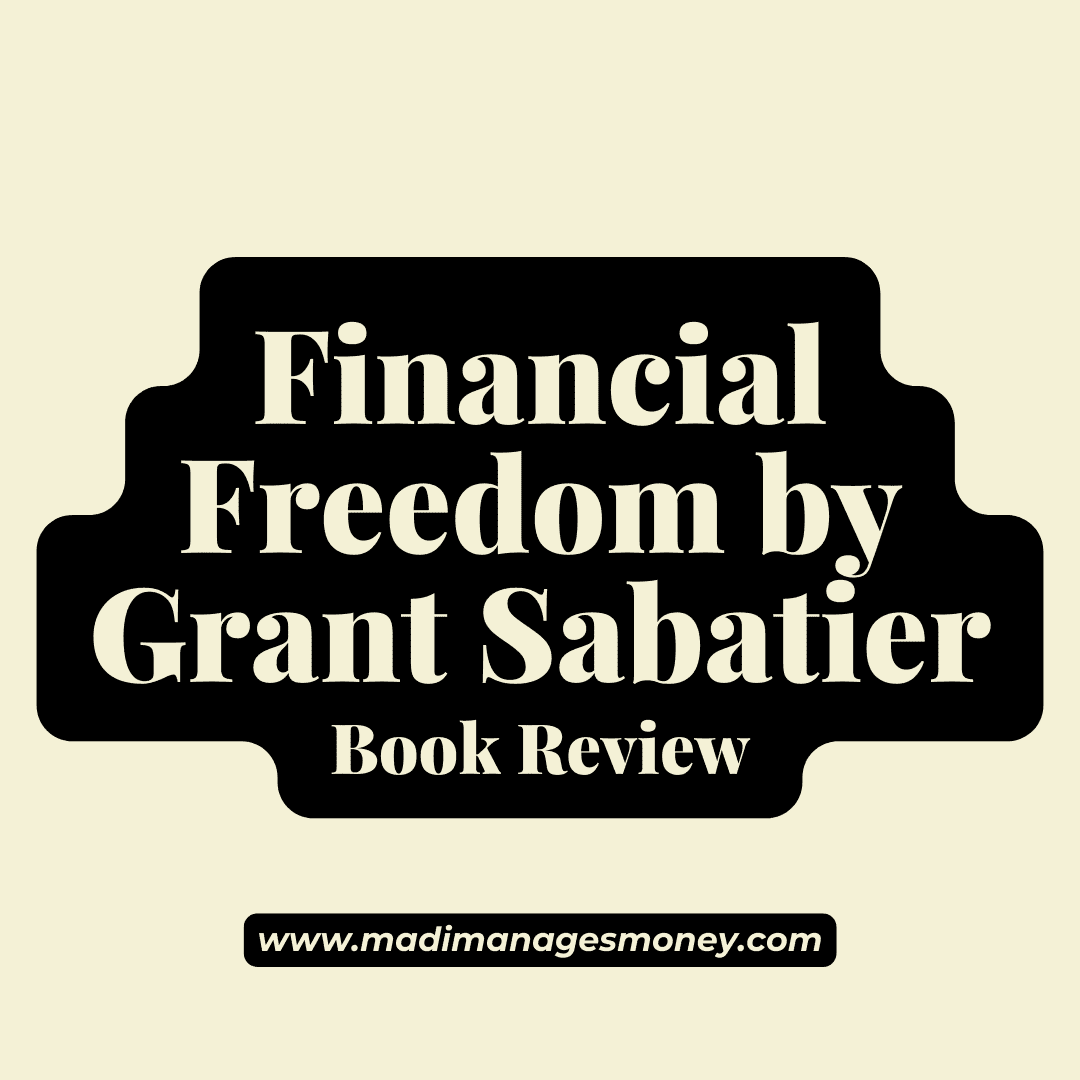Here’s what I thought of Financial Freedom by Grant Sabatier as a CFA, CFP, & parent.
I returned to my financial independence roots over the past week by reading Financial Freedom by Grant Sabatier. Grant’s blog, Millennial Money, had all 115 pounds of the mid-20s version of me ready to run through a brick wall in pursuit of FIRE.
Back in 2015, I was a house-hacking, side-hustling maniac who had a Texas Instruments BAII Financial Calculator and wasn’t afraid to use it. His blog spoke to me like I was the little girl from Poltergeist.

Financial Freedom shares how Grant went from having $2.26 in his bank account to over $1.25 million in just five years. In the book, he lays out the roadmap to achieve financial independence.
Financial independence is the milestone you reach when you have enough passive income (like income from rental properties or investment portfolios) to cover living expenses. The point is to achieve it earlier in life than what we think of as traditional retirement years.
The book felt like a trip down memory lane at times. At others, it felt unrelatable.
The more mature version of myself – the mother with a decade of career experience who has actually done this stuff – recognizes it would be challenging for parents to steadfastly implement some methods outlined in this book.
Nevertheless, Financial Freedom is a must-read if you’re fi-curious.
You’ll learn how to make more money in less time so you’re not dependent on jobs you hate until you’re old and gray. This book could change the trajectory of your family’s financial life.
Reasons to Read Financial Freedom
It makes a palatable case for not buying the latte.
Upon turning the final page, you’ll feel so motivated to invest early and often that you might find yourself brainstorming more ways to find extra money to invest.
Financial Freedom explains how compound interest works without feeling like you’re held hostage at a math tutoring session. You’ll learn how to rethink major purchases based on how much you could’ve had in the future if you invested your money instead.
(Yeah, there’s some weaponizing of time value of money against you in this book. Trust me, it reads more like a spirited half-time talk from your teammate than unsolicited financial advice from your Uncle Dave at a backyard cookout.)
My favorite example is a vintage car that costs $60,000 today. Grant reframes this purchase as a future dent in your finances you must be willing to accept.
In twenty years, your $60,000 could have grown to $243,495 if you invested it in the stock market instead and earned a 7% rate of return. But! To arrive at the true cost of the car, you’d multiply $243,495 by two.
This means a $60,000 purchase today becomes a $486,989 haircut to your net worth in the future.
Mastering these concepts of (a) time value of money and (b) opportunity cost sit at the core of getting good with money. This book will help you harness both.
Related Post: How to Make Compound Interest Work for You
Financial Freedom focuses on growing earnings, not deprivation through budgeting.
A small minority of the book is dedicated to expense management. After all, what you spend is directly related to how quickly you reach financial independence.
Multiply your annual expenses by 25 (or 30 to be conservative) to estimate how much you’d need to “retire.”
= Annual Expenses * 25 = Your Financial Independence Number
Beyond this, Financial Freedom goes on the offensive by exploring ways you can make more money. Expect a crash course in maximizing your full-time job, side-hustles, and passive income sources.
You can dynamically improve your circumstances and accelerate your path to financial independence through your earning potential, which is boundless.
In contrast, like the book emphasizes, focusing too much energy on cutting costs through budgeting leads to a scarcity mindset. Plus, majorly reducing expenses can be unsustainable and will only get you so far, especially if you have a family.
I couldn’t agree with this more. You should have an idea of what you spend from month to month – it plays a role in what you have leftover to invest – but you shouldn’t nickel and dime yourself if you’re hitting your investing goals.
My Critical Thoughts
Parts of this book feel impossible as a parent.
In my twenties, the hustle was real. I renovated an old duplex while living on one side and renting out the other. In the evenings, I moonlit as a landscaper. I rode my bike everywhere and owned a 2003 Toyota Corolla (whose rear seatbelts may or may not have worked) instead of buying a new car.
These are all quintessential financial independence maneuvers that helped me reach Coast FI before motherhood. They’re also decisions I’d never make now that I have a child.
When others depend on you, you can’t be as spartan. Plus, financial independence lifestyle choices often don’t jive with children for safety reasons, like having roommates or biking everywhere.
Plus, between cooking dinner, packing lunches, and the goddamn bedtime routine, there aren’t many parents who have much spare time to side-hustle, as recommended in Financial Freedom. This is especially true for women, who tend to absorb more housework and childcare duties than men, even when both spouses work full-time.
If you’re a parent, Financial Freedom is still worth a read. It includes many practical ways to get a financial leg up, and I’m confident it can fundamentally shift how you think about your family’s money.
Just beware that parts of this book are written for someone who hasn’t been woken up twice a night for almost two years straight.😵💫
Early retirement can reduce your Social Security benefits.
If pursuing financial independence with reckless abandon is for you, you’re probably a maximizer who wants to know all of the money-making angles. You may want to consider how retiring early will impact your future Social Security retirement benefits.
Nowhere in Financial Freedom are Social Security benefits discussed, which didn’t surprise me. In fairness, lack of awareness around Social Security is true of the financial independence movement at large and not unique to this book.
Millennials are on the hook for funding our own retirements with defined contribution plans and IRAs, both of which are at the mercy of market fluctuations. Most of us don’t have pensions like our parents and grandparents.
Social Security Retirement benefits could very will be the only stable source of income we have for decades of our life!
Benefits start as early as age 62 and come via a monthly check. In 2023, the average monthly benefit paid to retirees is $1,827, representing about 40% of pre-retirement earnings.
To qualify for your own benefits, you’ve gotta work for a minimum of 10 years. After that, your monthly benefit is based on your average earnings over 35 years.
Work longer than 35 years, and only the highest 35 are included in your average. Work less, and any years with no earnings count as a goose egg. All else equal, retiring early reduces your benefit.
I’m not saying don’t pursue financial independence because you need to get this Social Security bread. That’d be the tail wagging the dog.
If you’re in the fortunate position to “retire” at a very young age, though, you might consider working a few extra years to maximize what the government pays you.
Even if you make modest money doing something you love, it can disproportionately boost Social Security retirement benefits paid to you.
I’ll link the Social Security website below where you can estimate your monthly benefit.
Conclusion: A must-read when pursuing financial independence.
If I were to compare my financial knowledge to Grant Sabatier’s with a musician analogy, he’d be in an unbelievable, self-taught garage band that hits it big. I’d be more of a classically trained musician who’s a standout oboe player or something.
He doesn’t need my blessing – his band has achieved a level of success that we can only dream of from the woodwind section – but credit is due. Judging as both a CFA & CFP who’s been submerged in finance for a decade, his methods are legit.
As a parent, certain pages will have your shaking your head, wondering how you could possibly do what Grant’s suggesting. Pickup this book with an open mind, and don’t feel discouraged if you can’t do everything exactly as outlined.
Financial Freedom can radically change how you spend time, earn income, and invest money.
Resources:
- American Time Use Survey: U.S. Bureau of Labor Statistics
- Estimate your Social Security retirement benefit
The opinions voiced in this material are for general information only and are not intended to provide specific advice or recommendations for any individual. To determine which investments may be appropriate for you, consult with your financial advisor.

